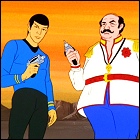 The tenth episode of the animated Star Trek series premieres on NBC, written by Harry Mudd’s creator, Stephen Kandel, and featuring Roger C. Carmel reprising the role of Mudd.
The tenth episode of the animated Star Trek series premieres on NBC, written by Harry Mudd’s creator, Stephen Kandel, and featuring Roger C. Carmel reprising the role of Mudd. ![]()

 The tenth episode of the animated Star Trek series premieres on NBC, written by Harry Mudd’s creator, Stephen Kandel, and featuring Roger C. Carmel reprising the role of Mudd.
The tenth episode of the animated Star Trek series premieres on NBC, written by Harry Mudd’s creator, Stephen Kandel, and featuring Roger C. Carmel reprising the role of Mudd. ![]()
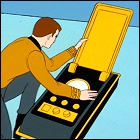 The 11th episode of the animated Star Trek series premieres on NBC, with a script by original series writer Stephen Kandel.
The 11th episode of the animated Star Trek series premieres on NBC, with a script by original series writer Stephen Kandel. ![]()
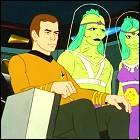 The 13th episode of the animated Star Trek series premieres on NBC, with a script by original series writer Margaret Armen.
The 13th episode of the animated Star Trek series premieres on NBC, with a script by original series writer Margaret Armen. ![]()
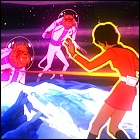 The 14th episode of the animated Star Trek series premieres on NBC, with a script by sci-fi novelist Larry Niven adapting one of his own short stories into the Star Trek universe.
The 14th episode of the animated Star Trek series premieres on NBC, with a script by sci-fi novelist Larry Niven adapting one of his own short stories into the Star Trek universe. ![]()
 The 16th episode of the animated Star Trek series premieres on NBC. The episode is written by Stephen Kandel, the writer who created the popular Trek character Harry Mudd.
The 16th episode of the animated Star Trek series premieres on NBC. The episode is written by Stephen Kandel, the writer who created the popular Trek character Harry Mudd. ![]()
 The 17th episode season of the animated Star Trek series airs on NBC. The second season premiere is written by 19-year-old Star Trek fan (and future Trek novelist) Howard Weinstein.
The 17th episode season of the animated Star Trek series airs on NBC. The second season premiere is written by 19-year-old Star Trek fan (and future Trek novelist) Howard Weinstein. ![]()
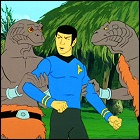 The 18th episode of the animated Star Trek series on NBC. The episode is written by The Trouble With Tribbles writer David Gerrold.
The 18th episode of the animated Star Trek series on NBC. The episode is written by The Trouble With Tribbles writer David Gerrold. ![]()
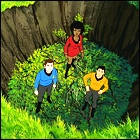 The 19th episode of the animated Star Trek airs on NBC, featuring scenes set in the Enterprise’s “recreation deck”, which can simulate any environment – more than a decade before Star Trek: The Next Generation’s holodeck.
The 19th episode of the animated Star Trek airs on NBC, featuring scenes set in the Enterprise’s “recreation deck”, which can simulate any environment – more than a decade before Star Trek: The Next Generation’s holodeck. ![]()
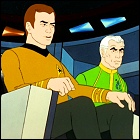 The 22nd episode of the animated Star Trek airs on NBC, bringing both the second season and the animated series to a close. This episode introduces now-retired Robert April, the name originally envisioned by Gene Roddenberry for the captain of the Enterprise.
The 22nd episode of the animated Star Trek airs on NBC, bringing both the second season and the animated series to a close. This episode introduces now-retired Robert April, the name originally envisioned by Gene Roddenberry for the captain of the Enterprise. ![]()
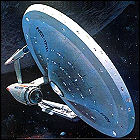 At a meeting at Paramount, studio head Michael Eisner formally cancels plans for a Star Trek television series reuniting the original cast (a decision made easier by the other networks strong-arming potential advertisers into freezing out Paramount’s network startup attempt) and sets the wheels in motion to revamp the pilot script, Alan Dean Foster’s In Thy Image, into a feature film. Contracts for the series are renegotiated (or in some cases cancelled) for the movie, but scriptwriters and designers continue to work on Trek TV scripts just in case the movie leads to a small-screen resurgence. The impetus for finally getting the long-stalled Star Trek movie underway? 20th Century Fox’s runaway success with Star Wars.
At a meeting at Paramount, studio head Michael Eisner formally cancels plans for a Star Trek television series reuniting the original cast (a decision made easier by the other networks strong-arming potential advertisers into freezing out Paramount’s network startup attempt) and sets the wheels in motion to revamp the pilot script, Alan Dean Foster’s In Thy Image, into a feature film. Contracts for the series are renegotiated (or in some cases cancelled) for the movie, but scriptwriters and designers continue to work on Trek TV scripts just in case the movie leads to a small-screen resurgence. The impetus for finally getting the long-stalled Star Trek movie underway? 20th Century Fox’s runaway success with Star Wars.
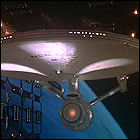 After a tortured development history dating back to aborted early 1970s attempts to relaunch Star Trek on the big screen, Paramount premieres the much-anticipated (and much hyped) Star Trek: The Motion Picture in theaters. At over two hours, and boasting one of Jerry Goldsmith’s best movie scores, the movie bewilders viewers as much as it thrills them. Paramount claims not to make a profit on the movie at all – primarily by including all of the development costs of years of early movie attempts and the never-made Star Trek Phase II television series as part of the movie’s price tag – but, despite its assertion that the movie lost money, the studio begins making plans for a sequel.
After a tortured development history dating back to aborted early 1970s attempts to relaunch Star Trek on the big screen, Paramount premieres the much-anticipated (and much hyped) Star Trek: The Motion Picture in theaters. At over two hours, and boasting one of Jerry Goldsmith’s best movie scores, the movie bewilders viewers as much as it thrills them. Paramount claims not to make a profit on the movie at all – primarily by including all of the development costs of years of early movie attempts and the never-made Star Trek Phase II television series as part of the movie’s price tag – but, despite its assertion that the movie lost money, the studio begins making plans for a sequel. ![]()
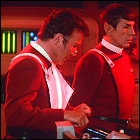 Produced and co-written by Harve Bennett (The Six Million Dollar Man, The Invisible Man) and directed by Nicholas Meyer, Star Trek II: The Wrath Of Khan debuts in theaters. The story follows up on the first season TV episode Space Seed, bringing back Ricardo Montalban (who is now a star thanks to his stint on ABC’s Fantasy Island) as Khan and introducing Kirstie Alley as a new member of the Enterprise crew. With faster pacing, increased action, and a more contemporary military sci-fi feel, the sequel is a hit that guarantees future sequels, as well as gradually increasing interest on Paramount’s part to return the franchise to television years later.
Produced and co-written by Harve Bennett (The Six Million Dollar Man, The Invisible Man) and directed by Nicholas Meyer, Star Trek II: The Wrath Of Khan debuts in theaters. The story follows up on the first season TV episode Space Seed, bringing back Ricardo Montalban (who is now a star thanks to his stint on ABC’s Fantasy Island) as Khan and introducing Kirstie Alley as a new member of the Enterprise crew. With faster pacing, increased action, and a more contemporary military sci-fi feel, the sequel is a hit that guarantees future sequels, as well as gradually increasing interest on Paramount’s part to return the franchise to television years later. ![]()
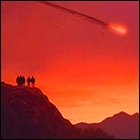 With producer Harve Bennett now firmly in creative control of the movie franchise, Star Trek III: The Search For Spock premieres in theaters, directed by Leonard Nimoy (who, since his character is being searched for, plays only a small role as an actor in the film). The movie is a direct sequel to the events of the previous film, and sets up story developments for the fourth Star Trek movie, effectively serving as the middle chapter of a trilogy. The movie’s success confirms Nimoy’s graduation from actor to director.
With producer Harve Bennett now firmly in creative control of the movie franchise, Star Trek III: The Search For Spock premieres in theaters, directed by Leonard Nimoy (who, since his character is being searched for, plays only a small role as an actor in the film). The movie is a direct sequel to the events of the previous film, and sets up story developments for the fourth Star Trek movie, effectively serving as the middle chapter of a trilogy. The movie’s success confirms Nimoy’s graduation from actor to director. ![]()
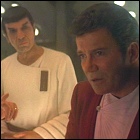 Directed by Leonard Nimoy, who also has a hand in development of the story, Star Trek IV: The Voyage Home premieres in theaters. Directly following up on events in the prior two movies, Star Trek IV closes out a trilogy, and by bringing the action to 20th century Earth, complete with fish-out-of-water comedy, becomes a solid hit with an embedded ecological message. The movie’s success caps off a year-long celebration of Star Trek’s 20th anniversary
Directed by Leonard Nimoy, who also has a hand in development of the story, Star Trek IV: The Voyage Home premieres in theaters. Directly following up on events in the prior two movies, Star Trek IV closes out a trilogy, and by bringing the action to 20th century Earth, complete with fish-out-of-water comedy, becomes a solid hit with an embedded ecological message. The movie’s success caps off a year-long celebration of Star Trek’s 20th anniversary ![]()
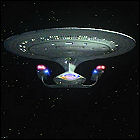 The national syndication window opens for the two-hour premiere of Star Trek: The Next Generation, Encounter At Farpoint. Written by Trek creator Gene Roddenberry and original series story editor D.C. Fontana, this episode introduces the fan favorite nemesis Q, as played by John de Lancie. Though it’s not tied to any network, some of the stations carrying TNG in syndication – including major-market stations – air TNG in prime-time in place of their usual network programming.
The national syndication window opens for the two-hour premiere of Star Trek: The Next Generation, Encounter At Farpoint. Written by Trek creator Gene Roddenberry and original series story editor D.C. Fontana, this episode introduces the fan favorite nemesis Q, as played by John de Lancie. Though it’s not tied to any network, some of the stations carrying TNG in syndication – including major-market stations – air TNG in prime-time in place of their usual network programming. ![]()
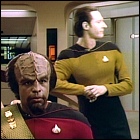 The week-long national syndication window opens for the second episode of Star Trek: The Next Generation. This episode becomes an immediate lightning rod of criticism since it almost duplicates a popular episode of the original Star Trek (and even points this out in the course of its story). Data also shows Lt. Yar that he is fully functional.
The week-long national syndication window opens for the second episode of Star Trek: The Next Generation. This episode becomes an immediate lightning rod of criticism since it almost duplicates a popular episode of the original Star Trek (and even points this out in the course of its story). Data also shows Lt. Yar that he is fully functional. ![]()
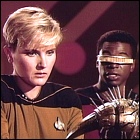 The week-long national syndication window opens for the third episode of Star Trek: The Next Generation. This is the only episode of any of the Star Trek spinoffs whose soundtrack was composed by a veteran of the original series’ music department (in this case, composer Fred Steiner).
The week-long national syndication window opens for the third episode of Star Trek: The Next Generation. This is the only episode of any of the Star Trek spinoffs whose soundtrack was composed by a veteran of the original series’ music department (in this case, composer Fred Steiner). ![]()
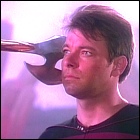 The week-long national syndication window opens for the fourth episode of Star Trek: The Next Generation. This is the first episode featuring a new alien race devised by Gene Roddenberry, the scheming, money-hungry Ferengi.
The week-long national syndication window opens for the fourth episode of Star Trek: The Next Generation. This is the first episode featuring a new alien race devised by Gene Roddenberry, the scheming, money-hungry Ferengi. ![]()
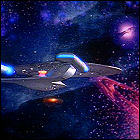 The week-long national syndication window opens for the fifth episode of Star Trek: The Next Generation, Where No One Has Gone Before. This is the first episode featuring the Traveler, as well as Wesley Crusher’s ascension to acting ensign.
The week-long national syndication window opens for the fifth episode of Star Trek: The Next Generation, Where No One Has Gone Before. This is the first episode featuring the Traveler, as well as Wesley Crusher’s ascension to acting ensign. ![]()
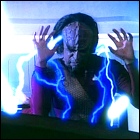 The week-long national syndication window opens for the sixth episode of Star Trek: The Next Generation. This is the first episode after Encounter At Farpoint to feature future Star Trek: Deep Space Nine regular Colm Meaney as a yet-to-be-named crewman.
The week-long national syndication window opens for the sixth episode of Star Trek: The Next Generation. This is the first episode after Encounter At Farpoint to feature future Star Trek: Deep Space Nine regular Colm Meaney as a yet-to-be-named crewman. ![]()
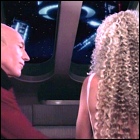 The week-long national syndication window opens for the seventh episode of Star Trek: The Next Generation.
The week-long national syndication window opens for the seventh episode of Star Trek: The Next Generation. ![]()
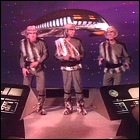 The week-long national syndication window opens for the eighth episode of Star Trek: The Next Generation. This is the second Ferengi episode, and the first episode to delve into Captain Picard’s previous command, the U.S.S. Stargazer.
The week-long national syndication window opens for the eighth episode of Star Trek: The Next Generation. This is the second Ferengi episode, and the first episode to delve into Captain Picard’s previous command, the U.S.S. Stargazer. ![]()
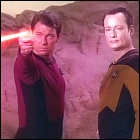 The week-long national syndication window opens for the ninth episode of Star Trek: The Next Generation. This is the second appearance of Q, and the first TNG glimpse of a female Klingon.
The week-long national syndication window opens for the ninth episode of Star Trek: The Next Generation. This is the second appearance of Q, and the first TNG glimpse of a female Klingon. ![]()
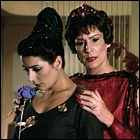 The week-long national syndication window opens for the tenth episode of Star Trek: The Next Generation. Majel Barrett Roddenberry, who played the recurring role of Nurse Chapel in the original Star Trek, makes the first of many appearances as Lwaxana Troi. This is actually one of the earliest episodes filmed.
The week-long national syndication window opens for the tenth episode of Star Trek: The Next Generation. Majel Barrett Roddenberry, who played the recurring role of Nurse Chapel in the original Star Trek, makes the first of many appearances as Lwaxana Troi. This is actually one of the earliest episodes filmed. ![]()
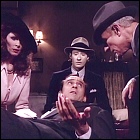 The week-long national syndication window opens for the 11th episode of Star Trek: The Next Generation. This episode, the first to take place almost entirely within the holodeck aboard the Enterprise, goes on to win a Peabody Award.
The week-long national syndication window opens for the 11th episode of Star Trek: The Next Generation. This episode, the first to take place almost entirely within the holodeck aboard the Enterprise, goes on to win a Peabody Award. ![]()
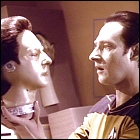 The week-long national syndication window opens for the 12th episode of Star Trek: The Next Generation. This episode introduces Data’s “brother” Lore, also played by Brent Spiner, and establishes an origin story for both.
The week-long national syndication window opens for the 12th episode of Star Trek: The Next Generation. This episode introduces Data’s “brother” Lore, also played by Brent Spiner, and establishes an origin story for both. ![]()